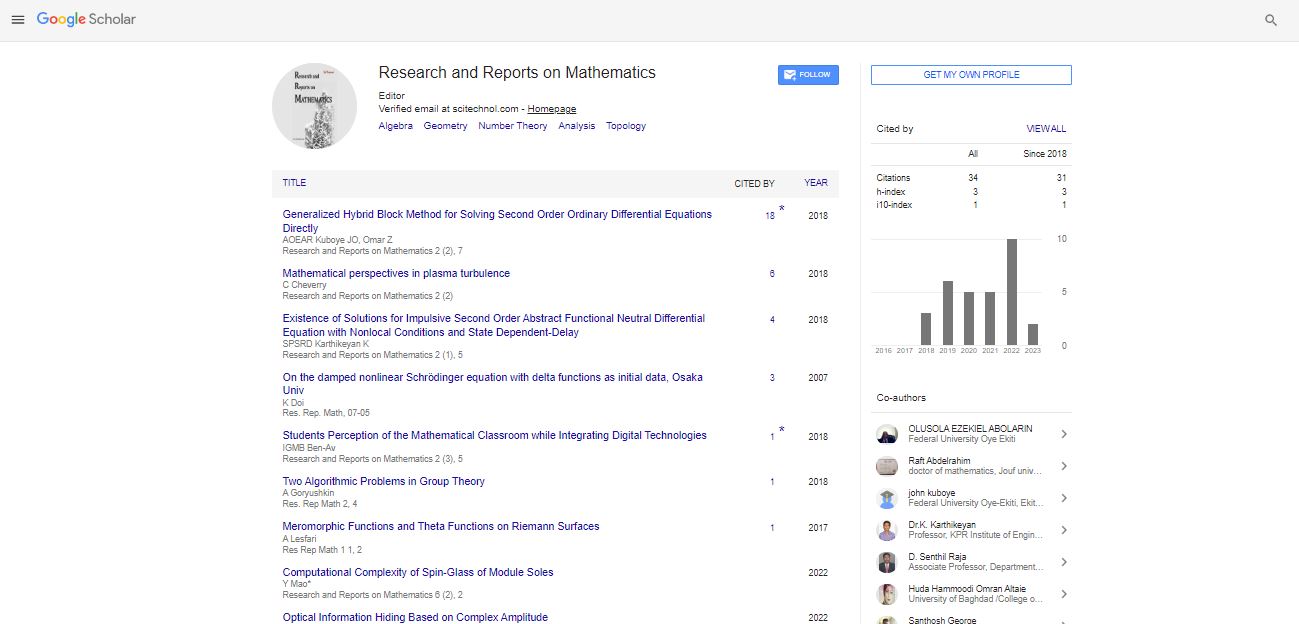Perspective, Res Rep Math Vol: 7 Issue: 5
Algebraic Abstractions: From Basics to Abstract Structures in Mathematics
Phillepe Mykola*
1Department of Mathematics, University of Cádiz, Puerto Real, Spain
*Corresponding Author: Phillepe Mykola,
Department of Mathematics, University
of Cádiz, Puerto Real, Spain
E-mail: mykola.phillepe@gmail.com
Received date: 27 November, 2023, Manuscript No. RRM-24-124947;
Editor assigned date: 29 November, 2023, PreQC No. RRM-24-124947 (PQ);
Reviewed date: 14 December, 2023, QC No.RRM-24-124947;
Revised date: 21 December, 2023, Manuscript No.RRM-24-124947 (R);
Published date: 28 December, 2023, DOI: 07.4172/rrm.1000211
Citation: Mykola P (2023) Algebraic Abstractions: From Basics to Abstract Structures in Mathematics. Res Rep Math 7:5.
Description
Algebra, often perceived as an intimidating branch of mathematics, plays a pivotal role in shaping our understanding of quantitative relationships and problem-solving. Its roots trace back to ancient civilizations, with the Babylonians and Greeks laying the foundation for the algebraic principles we use today. In essence, algebra is not just a mathematical discipline; it is a powerful tool that transcends the boundaries of numbers, providing a systematic approach to expressing and solving a wide array of real-world problems. To truly appreciate algebra, it is essential to delve into its historical development. The word "algebra" itself is derived from the Arabic term "al-jabr," coined by the mathematician Al-Khwarizmi in the 9th century.
The subsequent contributions of thinkers like Leonardo Fibonacci and René Descartes paved the way for the modern algebraic system. Through centuries of refinement, algebra evolved from a mere tool for solving equations to a comprehensive framework for understanding mathematical structures and relationships. At its core, algebra is concerned with the manipulation and analysis of symbols to represent and solve mathematical problems. Variables, constants, and operators become the building blocks of algebraic expressions, enabling us to formulate equations and inequalities. The beauty of algebra lies in its ability to provide a generalized framework applicable to a myriad of situations, from simple arithmetic problems to complex scientific and engineering applications.
One of the fundamental aspects of algebra is the set of basic operations that govern the manipulation of mathematical expressions. Addition, subtraction, multiplication, and division are the cornerstones of these operations. However, algebra takes these operations a step further by introducing concepts like exponents, radicals, and logarithms, expanding the toolkit for problem-solving. The systematic application of these operations allows mathematicians, scientists, and engineers to model and analyze various phenomena in the physical and social sciences. Equations and inequalities are the heart of algebra, providing a means to express relationships and solve problems. An equation is a mathematical statement asserting that two expressions are equal, while an inequality expresses a relationship between two quantities with the use of symbols such as <, >, ≤, and ≥.
Solving equations and inequalities involves applying algebraic techniques to isolate variables, leading to solutions that describe the relationships between different quantities. Linear algebra, a branch of algebra, focuses on the study of linear equations, matrices, vectors, and linear transformations. It has widespread applications in various fields, including physics, computer science, and economics. Understanding linear algebra enables practitioners to model and analyze complex systems, from quantum mechanics to machine learning algorithms. Matrices, in particular, serve as a powerful representation for linear transformations and are foundational in diverse mathematical applications.
While algebra's elementary aspects deal with numbers and their relationships, abstract algebra takes a more conceptual approach. This advanced branch explores algebraic structures such as groups, rings, and fields, providing a unified framework to study mathematical objects and their properties. Abstract algebra finds applications in cryptography, coding theory, and other areas where mathematical structures play a crucial role. The pervasive influence of algebra extends into the realms of science and engineering. From physics equations describing the motion of celestial bodies to engineering models predicting structural integrity, algebra is the common language used to express and solve complex problems. The ability to formulate and manipulate algebraic expressions empowers scientists and engineers to analyze data, design experiments, and make predictions, forming the backbone of technological advancements.
Beyond academic and professional applications, algebra infiltrates our daily lives in unsuspecting ways. Budgeting, calculating discounts, and determining optimal routes are examples of situations where algebraic reasoning is unconsciously applied. The ability to analyze and solve problems algebraically enhances critical thinking skills, enabling individuals to make informed decisions in various aspects of their lives. Despite its ubiquity and utility, algebra is often met with resistance and anxiety. Some students perceive it as an abstract and daunting subject, disconnected from their real-world experiences. Addressing this challenge requires educators to adopt innovative teaching methods that emphasize the practical applications of algebra and demonstrate its relevance to everyday life. Bridging the gap between abstract concepts and concrete examples can make algebra more accessible and enjoyable for learners
Conclusion
In conclusion, algebra is a dynamic and indispensable branch of mathematics that transcends the confines of mere number manipulation. Its historical evolution, fundamental principles, and diverse applications showcase the richness and versatility of algebraic thinking. From solving basic arithmetic problems to unraveling the mysteries of the universe, algebra serves as a powerful tool that empowers individuals across various disciplines. Embracing algebra not only fosters mathematical literacy but also cultivates critical thinking skills essential for navigating the complexities of the modern world. As we continue to unravel the intricacies of algebra, we unveil the beauty and utility that lie at the heart of this foundational mathematical discipline.
 Spanish
Spanish  Chinese
Chinese  Russian
Russian  German
German  French
French  Japanese
Japanese  Portuguese
Portuguese  Hindi
Hindi 